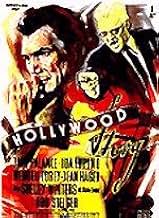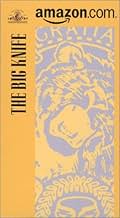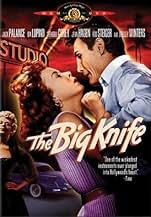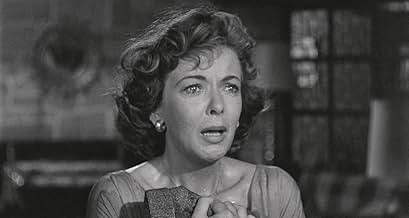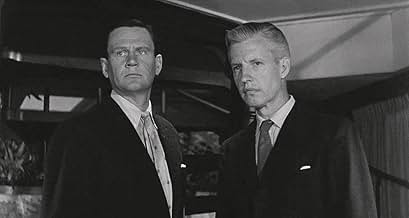AVALIAÇÃO DA IMDb
6,8/10
4,5 mil
SUA AVALIAÇÃO
Adicionar um enredo no seu idiomaHollywood actor Charles Castle is pressured by his studio boss into a criminal cover-up to protect his valuable career.Hollywood actor Charles Castle is pressured by his studio boss into a criminal cover-up to protect his valuable career.Hollywood actor Charles Castle is pressured by his studio boss into a criminal cover-up to protect his valuable career.
- Prêmios
- 1 vitória e 2 indicações no total
Michael Winkelman
- Billy Castle
- (as Mike Winkelman)
Shelley Winters
- Dixie Evans
- (as Miss Shelley Winters)
Richard Boone
- Narrator
- (narração)
- (não creditado)
Nick Cravat
- Nick
- (não creditado)
Robert Emhardt
- Bit Part
- (não creditado)
Michael Fox
- Prize Fight Announcer
- (não creditado)
Paula Kyle
- Party Guest
- (não creditado)
- Direção
- Roteiristas
- Elenco e equipe completos
- Produção, bilheteria e muito mais no IMDbPro
Enredo
Você sabia?
- CuriosidadesBecause of its vitriolic take on Tinseltown, this was unsurprisingly turned down by all the major studios in Hollywood. It eventually found a home at United Artists.
- Erros de gravaçãoThe camera and operator are visibly reflected in one scene in the living room.
- Citações
Smiley Coy: A woman with six martinis can ruin a city.
- Cenas durante ou pós-créditosIn the opening credits: Upholstered furniture by Martin/ Brattrud.
- ConexõesFeatured in Les dossiers de l'écran: Les coulisses du cinéma (1970)
Avaliação em destaque
Too talky for some, too stage-bound for others, too strident for all, this is not a movie for everyone. Yet The Big Knife continues to fascinate at the same time it annoys. Maybe it's the savage depiction of Hollywood politics and the amoral glamour industry surrounding it. After all, neither blackmail nor murder is off-limits to ego-maniacal studio boss Stanley Hoff ( vintage Rod Steiger), while the human sharks swimming around him behave nothing like opening night at the Oscars. Maybe it's the sterling cast, featuring such 50's exotica as Steiger, Jack Palance, Wendell Corey, and Shelley Winters. In the end, of course, everyone gets to explode on screen except the ice cold Corey whose chronic bemusement proves ultimately more satanic than cynical. Whatever the reason, the result is an over-the-top cavalcade of unusual flair.
It's likely that producer-director Robert Aldrich targeted the film in behalf of blacklisted mentor Abraham Polonsky with whom he had collaborated on 1948's Force of Evil. After all, the year was 1955 and the all-powerful list could not be attacked directly, so what better vehicle than Clifford Odet's corrosive stage play adapted for all America to see. (Odets would do the same for Broadway in 1957's revealing Sweet Smell of Success.) It's fun to imagine how Aldrich's resulting indictment played in studio screening rooms where real reputations were at stake. Then too, much of the film's dirty laundry appears based on fact. The hit and run on Clark Gable's hushed-up 1933 episode; the Palance character on John Garfield's death at 39, listed officially as heart attack. It's hard to picture the producers ever believing such curdled fare would actually make money. Of course it didn't, angering many ticket-buyers with a title that seemed to imply real action instead of endless palaver. Still, this overheated exercise in shameless baroque remains an interesting oddity. A permanent record not only of individual styles, but of artistic protest amidst the throes of cultural repression.
It's likely that producer-director Robert Aldrich targeted the film in behalf of blacklisted mentor Abraham Polonsky with whom he had collaborated on 1948's Force of Evil. After all, the year was 1955 and the all-powerful list could not be attacked directly, so what better vehicle than Clifford Odet's corrosive stage play adapted for all America to see. (Odets would do the same for Broadway in 1957's revealing Sweet Smell of Success.) It's fun to imagine how Aldrich's resulting indictment played in studio screening rooms where real reputations were at stake. Then too, much of the film's dirty laundry appears based on fact. The hit and run on Clark Gable's hushed-up 1933 episode; the Palance character on John Garfield's death at 39, listed officially as heart attack. It's hard to picture the producers ever believing such curdled fare would actually make money. Of course it didn't, angering many ticket-buyers with a title that seemed to imply real action instead of endless palaver. Still, this overheated exercise in shameless baroque remains an interesting oddity. A permanent record not only of individual styles, but of artistic protest amidst the throes of cultural repression.
- dougdoepke
- 26 de ago. de 2009
- Link permanente
Principais escolhas
Faça login para avaliar e ver a lista de recomendações personalizadas
- How long is The Big Knife?Fornecido pela Alexa
Detalhes
- Data de lançamento
- País de origem
- Idioma
- Também conhecido como
- The Big Knife
- Locações de filme
- Empresa de produção
- Consulte mais créditos da empresa na IMDbPro
Bilheteria
- Orçamento
- US$ 423.000 (estimativa)
- Tempo de duração1 hora 51 minutos
- Cor
- Proporção
- 1.85 : 1
Contribua para esta página
Sugerir uma alteração ou adicionar conteúdo ausente

Principal brecha
By what name was A Grande Chantagem (1955) officially released in India in English?
Responda

